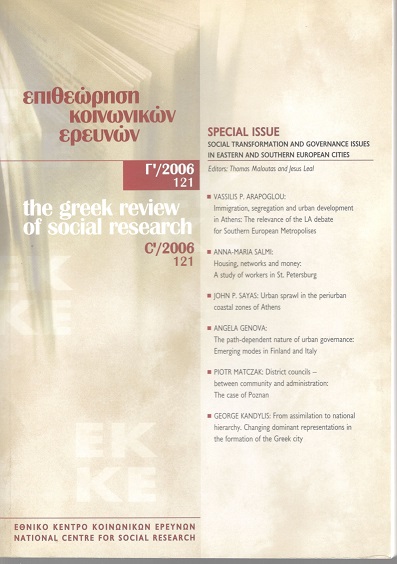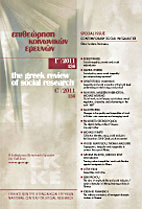From assimilation to national hierarchy. Changing dominant representations in the formation of the Greek city
Περίληψη
During most of the 20th century the processes and the pattern of urbanization in Greece were based on certain preconditions, that have the object of numerous analyses and are almost commonly recognized as such: from capital accumulation peculiarities to planning deficit; from tolerance against irregular space appropriation practices to the family-centered social reproduction and from rural decline to clientelism, what usually varies is only the focal point and the linkages between the parts that compose the whole pattern. An additional typical component of the Greek social system, although usually pointed out in other research fields, has rarely been connected to the production of Greek urban space. It is a major characteristic, however, of Greek political culture and especially of its formal - state expressions, namely the dominant representations about national homogeneity, as part of Greek nationalism. This paper is about the ways in which this principle of (undisturbed) national homogeneity has influenced the formation of Greek cities during the last century. Since the first period of its implementation it produced some characteristic consequences and namely the tendency to assimilate every ethnically different population, to expulse those who would not (or could not) be assimilated and to isolate those who stayed behind. Eventually, in the early post-war authoritarian context, the accusation for actions or defects judged not to abide by the dominant national narratives could cause the exclusion from any opportunity to participate to the benefits of urban development. Authoritarianism came to an end, and the absolute division around national origin and national reliability seemed to lose its importance, when the multi-ethnic “problem” had been technically solved because of its very implementation. Nevertheless, it was in that time that a new multi-ethnic wave of immigration started to redefine the urban formation processes. New transnational immigrants are considered not only non-Greeks but also temporary and “illegal”; at the same time they are considered as “necessary” labour force, and all these controversial approaches have led to new forms of social differentiation and to a new kind of national hierarchy. The presence of non-Greeks is an issue in the dominant political agenda, and a process of social integration is under way. Non-participation in the dominant narrative continues to be detrimental for rights and limits the appropriation of urban space. The central hypothesis presented here is that the dominant representations about an ethnically homogeneous urban space are still in the foreground, but this time, instead of producing a rigorous assimilation or exclusion division, they produce an unprecedented (in Greece) ethnic hierarchy, with ethnically uneven rights to the city.
Λεπτομέρειες άρθρου
- Πώς να δημιουργήσετε Αναφορές
-
Kandylis, G. (2016). From assimilation to national hierarchy. Changing dominant representations in the formation of the Greek city. Επιθεώρηση Κοινωνικών Ερευνών, 121, 157–174. https://doi.org/10.12681/grsr.9573
- Ενότητα
- Άρθρα

Αυτή η εργασία είναι αδειοδοτημένη υπό το CC Αναφορά Δημιουργού – Μη Εμπορική Χρήση 4.0.
Οι συγγραφείς των άρθρων που δημοσιεύονται στην Επιθεώρηση Κοινωνικών Ερευνών διατηρούν τα δικαιώματα πνευματικής ιδιοκτησίας επί των άρθρων τους, δίνοντας στο περιοδικό το δικαίωμα της πρώτης δημοσίευσης. Άρθρα που δημοσιεύονται στην Επιθεώρηση Κοινωνικών Ερευνών διατίθενται με άδεια Creative Commons 4.0 και σύμφωνα με την άδεια μπορούν να χρησιμοποιούνται ελεύθερα, με αναφορά στο/στη συγγραφέα και στην πρώτη δημοσίευση για μη κερδοσκοπικούς σκοπούς.
Το Εθνικό Κέντρο Κοινωνικών Ερευνών διατηρεί το δικαίωμα να δημοσιεύει, να αναπαραγάγει, να παρουσιάζει στο κοινό, να διανέμει και χρησιμοποιεί άρθρα που δημοσιεύονται στην Επιθεώρηση Κοινωνικών Ερευνών σε οποιοδήποτε μέσο και μορφή είτε μεμονωμένα είτε ως μέρη συλλογικών έργων, για όλο τον χρόνο διάρκειας προστασίας της πνευματικής ιδιοκτησίας και για όλες τις χώρες του κόσμου. Αυτό περιλαμβάνει ενδεικτικά και όχι αποκλειστικά το δικαίωμα δημοσίευσης των άρθρων σε τεύχη της Επιθεώρησης Κοινωνικών Ερευνών, αναπαραγωγής και διανομής μεμονωμένων αντιγράφων των άρθρων, αναπαραγωγής ολόκληρων των άρθρων σε άλλη έκδοση του Εθνικού Κέντρου Κοινωνικών Ερευνών, καθώς και αναπαραγωγής και διανομής των άρθρων ή περίληψης αυτών με χρήση πληροφορικού συστήματος αποθετηρίου.




